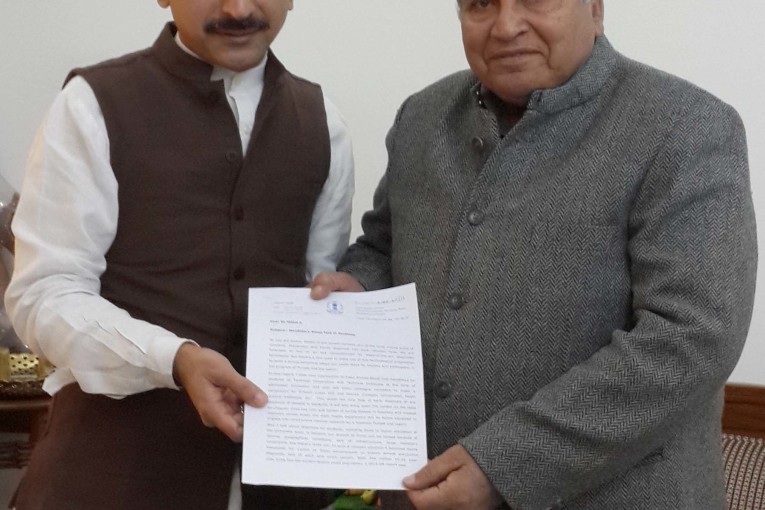Sh Madan Mohan Mittal, 23-1-15
Industry & Commerce,
Technical Education & Industrial Training,
Parliamentary Affairs, Minister, Punjab.
Subject:- Mandatory Blood Test of Students.
Dear Sh Mittal ji,

Demanding Mandatory Annual Blood Test of students, Asst Media Advisor Vineet Joshi submitting a memorandum to Technical Education Minister Punjab Sh MM Mittal, here today at Chandigarh. (23-1-2015)
As you are aware, Health of the people remains one of the most critical areas of concerns. Prevention and timely diagnosis can save valuable lives. We are fortunate to live in an era revolutionized by state-of-the-art diagnostic techniques. But there’s a dire need to make use of this technological progression to build a strong tomorrow where our youth stays fit, healthy and participates in the progress of Punjab and the nation.
In this regard, I seek your intervention to make Annual Blood Test mandatory for students of Technical Universities and Technical Institutes at the time of admission/ promotion and also ask other colleague ministers to make it compulsory for Schools (class VIII and above), Colleges, Universities, Heath Science Institutes, etc. This would not only help in early diagnosis of any likelihood of disease in students, it will also bring down the burden on the state ex-chequer. Once the rush and burden of curing disease in hospitals and medical institutes comes down, the state health department will be better equipped to engage into constructive medical research for a healthier Punjab and nation.
Why I talk about diagnosis for students, including those in higher education at the university level, is because our actions at times can be limited because of diverse geographical conditions, lack of infrastructure, huge monetary constraints, low literacy level, etc. In such a complex situation it becomes nearly impossible for Centre or State Governments to ensure annual preventive diagnostic test of each and every person. With 356 million 10-24 year-olds, India has the world’s largest youth population, a 2014 UN report said.
The answer lies in checking the problem at a nascent stage through mandatory annual blood tests in schools, colleges, universities and technical & medical institutes in the state. The record can be maintained by educational institution.
This exercise has an inherent advantage that bolsters the state government’s war against drugs. By making this test compulsory, it will not be hard to identify students who have fallen prey to the menace of drugs. With this, we will not only be able to help such students with timely medical, sociological and psychological interventions, it will also help us in further preventing the spread of drugs in educations institutions. Identification and leads to nab drug traffickers will also be possibly this way.
It is desirable to act expeditiously in this direction since educational institutions are places which are soft target for drug peddlers. Mandatory tests in schools and higher education institutes are a sure remedy. Let Punjab make another fruitful beginning.
Your support and guidance can make a difference.
Regards
(Vineet Joshi)




